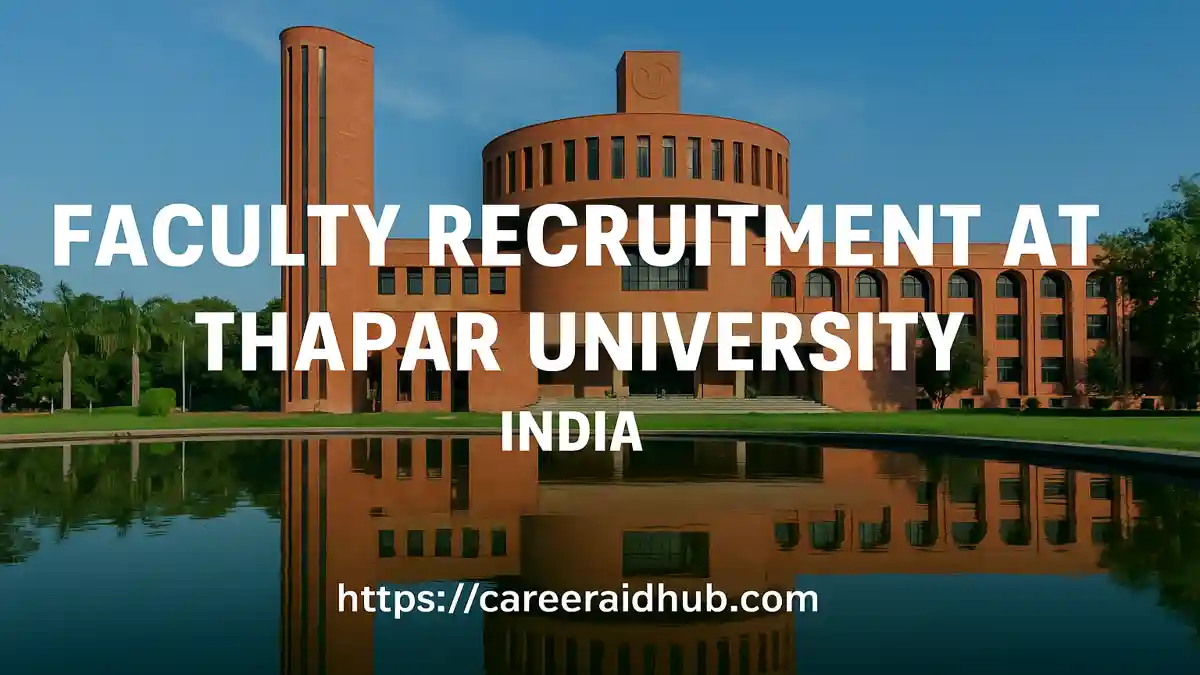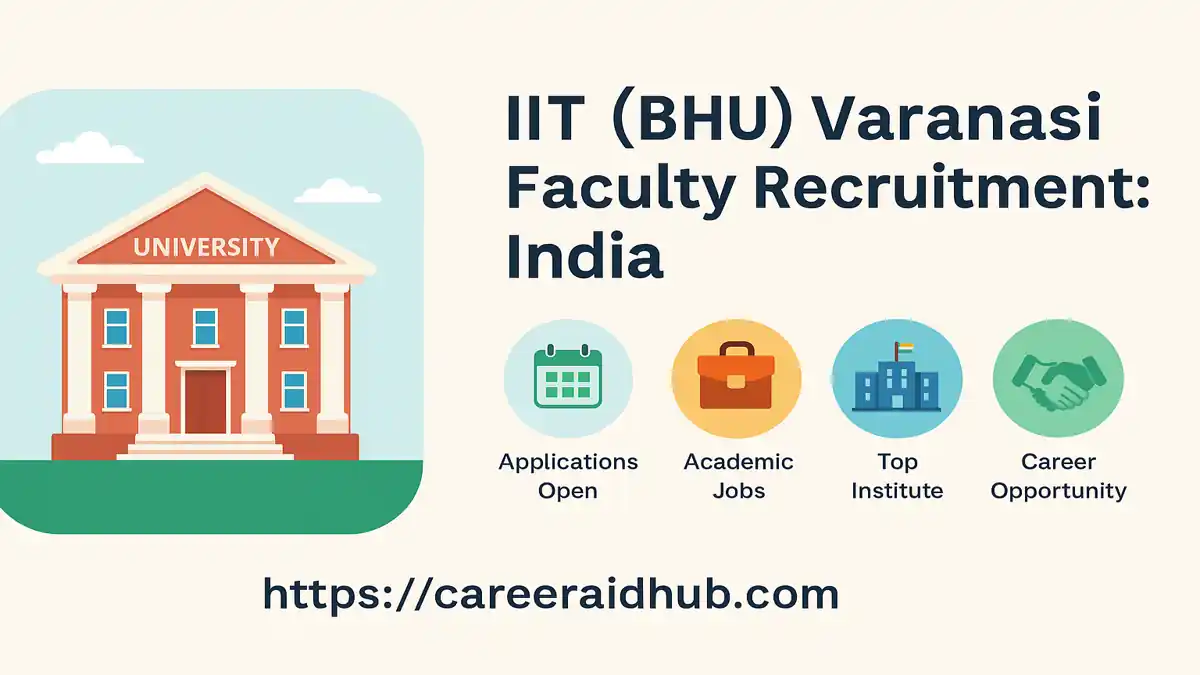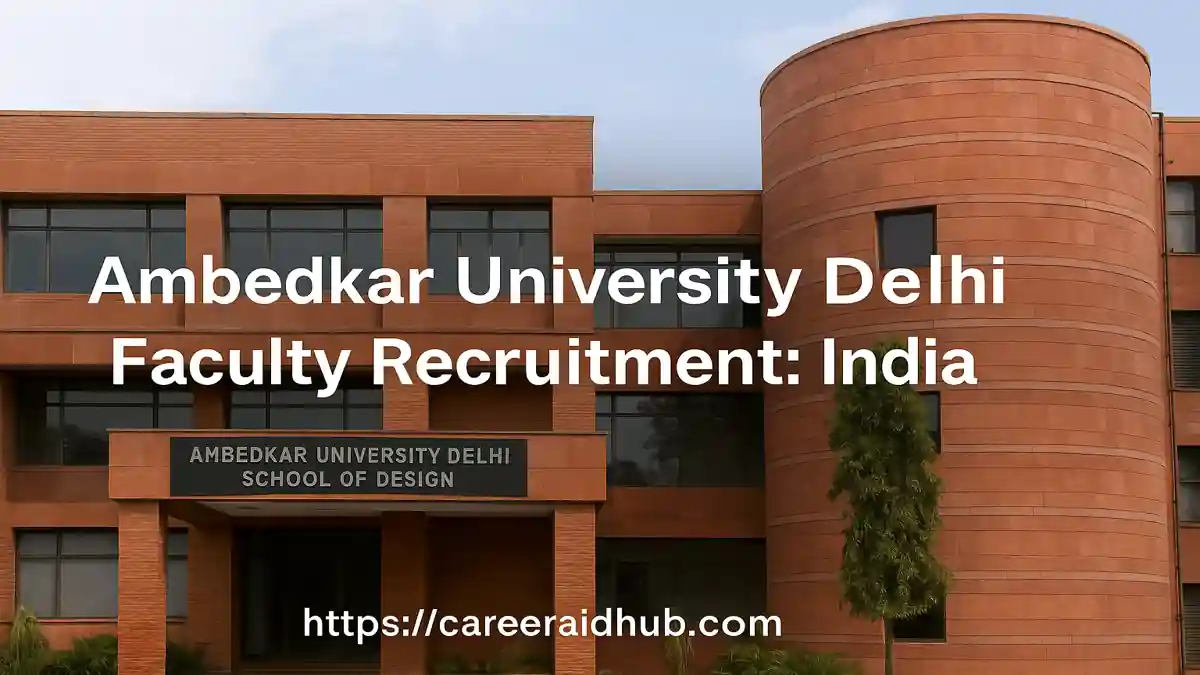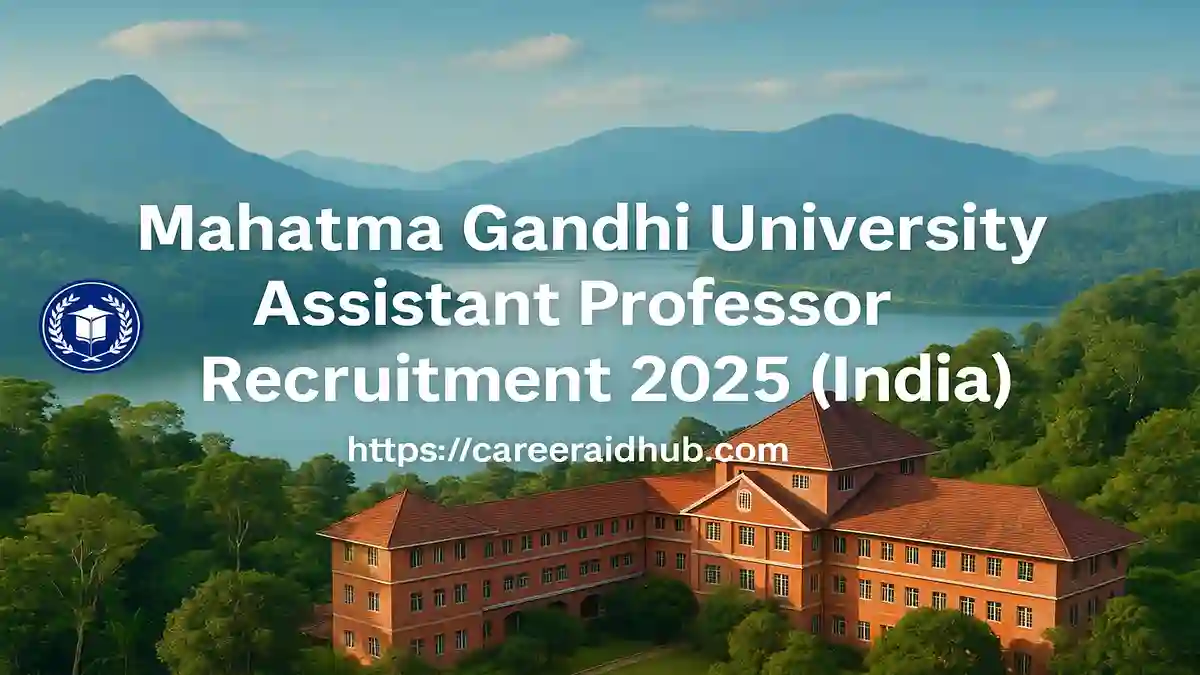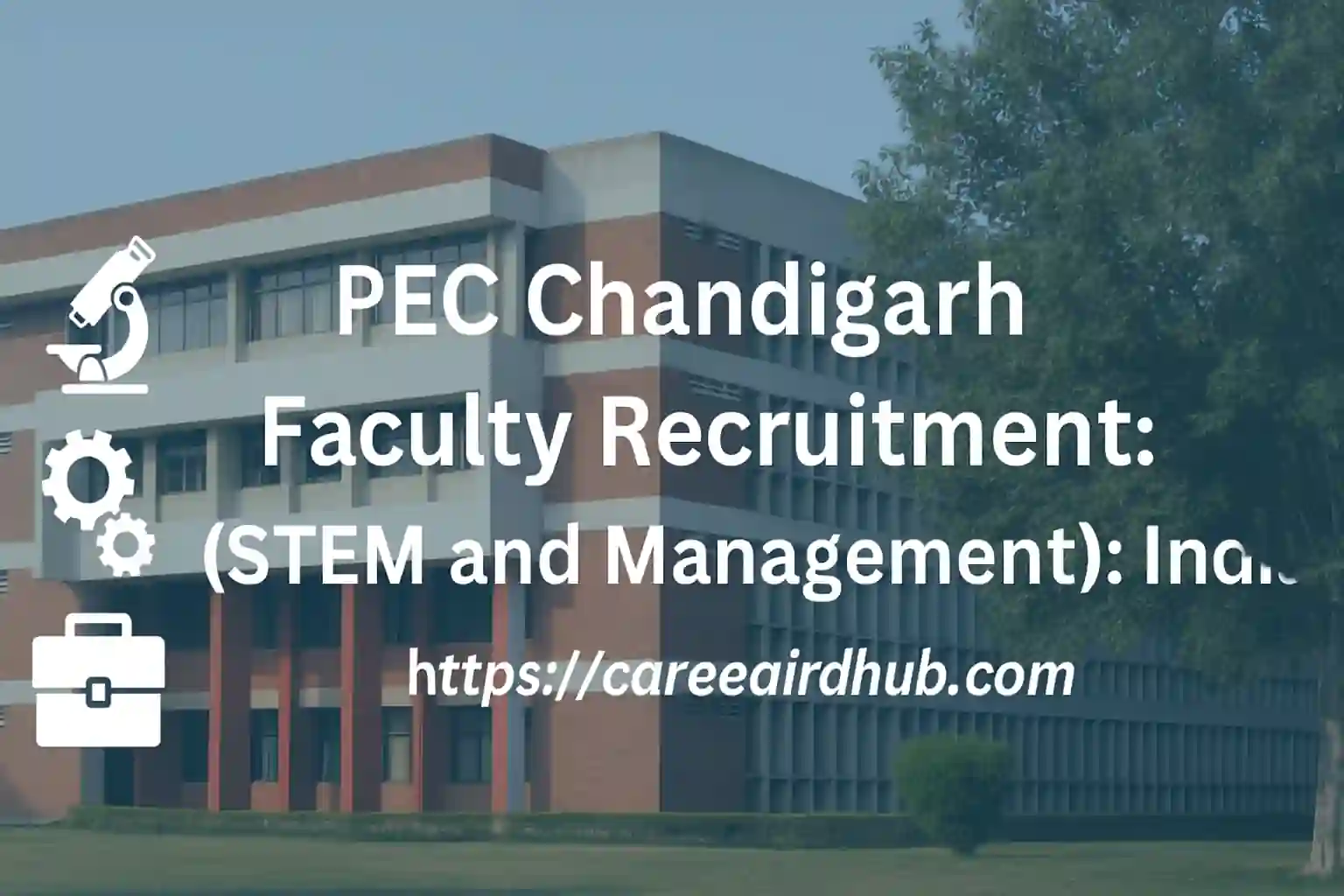Faculty Recruitment at Thapar University: Opportunities, Criteria & How to Apply
Thapar Institute of Engineering & Technology (commonly known as Thapar University) is a nationally respected research-led university in Punjab, India. Over several decades, it has built a strong teaching-research ecosystem anchored in engineering, applied sciences, management, and the liberal arts. Consequently, its faculty recruitment rounds attract applicants with diverse academic interests and strong research credentials.
The current hiring cycle—accessible via the official Faculty Openings portal—seeks candidates for multiple departments and centers, including regular and fixed-term roles. Prospective applicants can review post-specific information, eligibility benchmarks, and application steps directly on the university’s website.
Thapar Institute of Engineering & Technology (TIET), Patiala, invites applications for faculty positions across engineering, sciences, management, and liberal arts. Openings span Assistant Professor, Associate Professor, and research/contractual roles, offering competitive compensation, research support, and clear progression pathways for scholars committed to impactful teaching, funded research, and collaborative academic leadership.
Positions and Disciplines
Range of Roles
Thapar is recruiting across a broad spectrum of positions to address growing program needs and expand research depth:
-
Regular Faculty: Assistant Professor, Associate Professor
-
Research / Contractual Faculty: Time-bound posts that prioritize project-driven research and lab building
Academic Homes and Focus Areas
Openings typically span:
style="text-align: justify;">
Engineering and Technology: Civil, Mechanical, Electrical, Electronics and Communication, Computer Science & Engineering, Information Technology, Chemical, and allied domains
Sciences and Mathematics: Physics, Chemistry, Mathematics, Materials, Environmental science interfaces
Management and Economics: Business management, analytics, operations, finance, strategy, and entrepreneurship
Liberal Arts & Interdisciplinary Studies: Humanities, social sciences, and cross-cutting specializations in the Thapar School of Liberal Arts & Sciences (TSLAS)
Faculty ads often highlight signature thrusts—e.g., Robotics & AI, Mechatronics, VLSI/embedded, data science, renewable energy systems, cyber-physical systems, and sustainability—along with expectations for teaching breadth and research depth.
Eligibility Requirements & Standards
Recruitment standards are intentionally rigorous to sustain academic quality and research productivity. While individual advertisements may add role-specific criteria, the following expectations commonly apply.
Academic Qualifications (Core)
-
-
Ph.D. in the relevant discipline is generally required for regular tenure-track roles.
-
Candidates nearing completion may be considered with proof of thesis submission/award before joining.
-
A consistently strong academic record at earlier degree levels (First Class or equivalent) is expected.
Research Output and Trajectory
-
-
Peer-reviewed publications in high-quality journals and conferences appropriate to the field
-
Evidence of citations, patents, datasets, software, or translational outcomes where relevant
-
Demonstrated potential
(or track record) for securing competitive external funding and building collaborative research programs
Teaching and Academic Service
-
-
Ability to design and deliver undergraduate and graduate courses, including labs and project supervision
-
Clear, student-centric pedagogy; willingness to adopt outcome-based education and digital learning tools
-
Contribution to academic service (curriculum committees, accreditations, outreach, professional bodies)
Department-Specific Fit
-
-
Alignment with advertised specialization clusters (e.g., AI/ML, embedded systems, energy technologies, human-centered computing, quantitative finance)
-
Capacity to complement existing strengths and co-create interdepartmental research initiatives
Compensation & Benefits
Thapar offers competitive compensation calibrated to rank and role:
-
-
Regular Faculty: Salary and benefits aligned with institutional norms; performance-linked increments and access to internal/external research grants
-
Research/Contractual Faculty: Consolidated monthly remuneration with performance incentives (as per specific advertisements)
Enablers for Success
-
-
Seed grants to initiate research; access to modern laboratories, makerspaces, and computing infrastructure
-
Conference travel and professional development support (subject to policies)
-
Health benefits, leave policies, housing assistance (where applicable), and on-campus amenities
-
Structured pathways for career advancement through transparent evaluation criteria
Application Process
& Timeline
A complete application improves shortlisting prospects and accelerates evaluation.
How to Apply (Step-by-Step)
-
-
Review the Official Notice
Visit the Faculty Openings page to identify relevant advertisements, eligibility benchmarks, and required forms.
-
Prepare Your Dossier
-
Targeted cover letter stating fit with department priorities
-
Detailed CV (education, positions held, publications with bibliometrics, funded projects, awards)
-
Research statement (past work, near-term agenda, potential collaborations)
-
Teaching statement (philosophy, sample courses, innovations, evaluation evidence)
-
List of referees (current contact details) and degree certificates/transcripts
-
Any portfolio items (code repositories, datasets, patents) where relevant
-
Submit Online
Upload materials through the official portal only. Follow file-naming and format guidelines meticulously.
-
Track Acknowledgments
Retain submission proof and note any additional instructions (e.g., presentation topics, sample lectures).
-
Selection Stages
Typical flow: shortlisting → research/teaching presentation → interview → document verification → offer.
Dates and Rolling Windows
-
-
Many thematic calls operate on rolling cycles, with periodic review windows.
-
When the university publishes a cycle-specific deadline, it is usually set within a particular month; exact dates can vary by advertisement.
-
Next cycle (prediction): based on historical hiring patterns, new calls frequently appear around March/April
and September/October. We will update soon when fresh timelines are announced.
Why Join Thapar University?
1) Research Ecosystem with Real-World Impact
Faculty work within an ecosystem that values discovery, design, and deployment. Interdisciplinary centers often partner with industry and public agencies, enabling technology translation and policy-relevant scholarship.
2) Interdisciplinary Teaching and Mentorship
With programs cutting across engineering, sciences, management, and liberal arts, classroom experiences are intentionally interdisciplinary. Faculty mentor capstone projects, incubate student startups, and guide doctoral scholars.
3) Growth, Recognition, and Networks
Clear evaluation norms recognize balanced excellence in research, teaching, and service. The institute supports conference travel, visiting scholar stints, and international collaborations to help faculty grow recognized profiles.
4) Campus, Community, and Culture
The Patiala campus offers a collegial environment, state-of-the-art learning spaces, and student-centric support services—an ideal setting to build laboratories, research groups, and lasting collaborations.
Tips for a Competitive Application
-
-
Lead with fit: Map your expertise to the department’s specific thrust areas and articulate collaboration plans.
-
Prioritize quality: Emphasize impactful publications, methods contributions, patents, tools, or datasets.
-
Show classroom strength: Provide sample syllabi, pedagogic innovations, student feedback summaries, and learning outcomes.
-
Plan for funding: Include a 12–24-month grant strategy (national/international schemes; industry R&D).
-
Request references early: Give referees your CV, research/teaching statements, and highlights so letters are timely and specific.
-
Polish presentation materials: Prepare a research talk and a sample lecture tailored to a mixed audience.
Conclusion
Thapar University’s faculty recruitment round offers a compelling platform for scholars who value rigorous research, engaged teaching, and collaborative institution-building. Because the institute actively invests in labs, interdisciplinary curricula, and external partnerships, new hires can launch high-impact projects, mentor motivated students, and shape emerging academic programs from day one. Interested applicants should review the official advertisement carefully, prepare complete dossiers tailored to departmental priorities, and apply well ahead of review windows.
Summary Table
| Feature |
Details |
| Institution |
Thapar Institute of Engineering & Technology (TIET), India |
| Recruitment Type |
Regular and research/contractual faculty roles |
| Disciplines |
Engineering, sciences, management, liberal arts, interdisciplinary |
| Eligibility |
Ph.D. (required for most roles) and strong research/teaching profile |
| Specializations |
AI/ML, robotics, mechatronics, VLSI, data science, energy, and more |
| Compensation |
Competitive salary, benefits, seed grants, performance incentives |
| Application Mode |
Online via the official Faculty Openings portal |
| Typical Windows |
Calls often cluster around March/April and Sept/Oct (predicted) |
| Next Update |
New timelines expected; we will update soon |
| Official Link |
Faculty Openings (TIET) |
References (Official URLs)
Frequently Asked Questions
How can I apply for faculty positions at Thapar University? You can apply online through the official Thapar University Faculty Openings portal by submitting your CV, research profile, and supporting documents.
What are the eligibility criteria for Thapar University faculty recruitment? Applicants must hold a Ph.D. in the relevant discipline, have strong research publications, and meet department-specific teaching and specialization requirements.
Does Thapar University recruit Assistant Professors without a Ph.D.? Generally, a Ph.D. is mandatory. However, candidates nearing completion may be considered if they provide proof of thesis submission before joining.
What disciplines are covered under Thapar University faculty openings? Faculty positions span engineering, computer science, management, sciences, liberal arts, and interdisciplinary areas like robotics, AI, data science, and sustainability.
What is the selection process for Thapar University faculty recruitment? The process usually includes shortlisting, a research presentation, a teaching demonstration, and a final interview with the selection committee.
What is the salary package for faculty at Thapar University? Thapar offers competitive pay, performance-linked incentives, research funding support, and additional benefits such as medical coverage and housing assistance.
Are international candidates eligible for Thapar University faculty jobs? Yes, international applicants can apply if they meet academic qualifications, research standards, and institutional eligibility requirements.
Does Thapar University provide research funding to new faculty? Yes, new faculty may receive seed grants, lab support, and opportunities for externally funded projects to establish their research programs.
How often does Thapar University announce faculty openings? Thapar follows a rolling recruitment model, with major advertisements usually released twice a year, typically around March/April and September/October.
Where can I check the latest Thapar University faculty recruitment notifications? The latest job advertisements and updates are published on the official Thapar University Faculty Openings web page.
Premium Mentorship for a Stronger Application
- Premium Mentorship: personalised 1:1 guidance for this and similar opportunities
- In-depth review of your CV, academic profile, and key statements
- Aligned with international selection criteria so your profile matches what panels expect
- Stronger, more compelling narrative for highly competitive calls
- Step-by-step support from opportunity mapping to final submission (fee-based)
Subscribe Premium Mentorship

